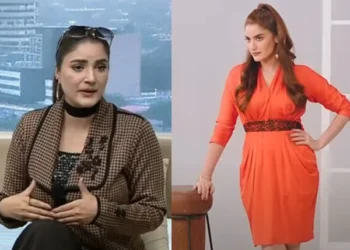Actress Highlights How Comparisons and Jealousy Are Weakening Marriages in Modern Times
Pakistani actress Hiba Ali, who has been making her mark in the entertainment industry with her performances, recently shared a thought-provoking piece of advice for married women. In a candid interview, she addressed a growing issue in today’s relationships and shed light on how certain habits, particularly among women, can gradually weaken the foundation of marriages.
Hiba Ali emphasized that the act of comparing one’s spouse or marriage with others is one of the major reasons behind misunderstandings, conflicts, and even separations between couples. She not only identified the problem but also suggested a practical solution that could help many women strengthen their homes rather than unknowingly destroy them.
The Core of Hiba Ali’s Message: The Dangers of Constant Comparisons
When asked about the main reasons behind the rise of conflicts and separations in marriages today, Hiba Ali pointed to one destructive habit: comparison and jealousy.
According to her, many women have developed the tendency to constantly compare their husbands with others—be it friends, relatives, or even people they follow on social media. This habit, she explained, often becomes the seed of disappointment and dissatisfaction, ultimately leading to a breakdown in the marital bond.
Example From a Friend’s Experience
Hiba Ali shared a personal anecdote to clarify her point. She narrated that one of her close friends’ husbands once confided in her, saying:
“My relationship with my wife is being damaged only because she compares herself and our life with others all the time.”
The husband further explained how his wife repeatedly brought up comparisons such as:
- “So-and-so’s husband bought her a new car, why can’t you do the same for me?”
- “My friend got an expensive dress on her birthday, why didn’t you buy me one?”
Such constant comparisons, according to Hiba, created unnecessary strain and dissatisfaction in the marriage, despite the husband’s sincere efforts to provide within his means.
The Role of Social Media in Shaping Unrealistic Expectations
Hiba Ali also drew attention to the negative impact of social media on women’s thinking patterns. In her view, platforms like Instagram and TikTok have become showcases of luxury lifestyles, exotic vacations, and lavish gifts, which often give women a distorted picture of reality.
Why Social Media Fuels Comparison
- Highlight Reels vs. Real Life: People usually post only the best parts of their lives online, hiding the struggles, compromises, and challenges behind the scenes.
- Unrealistic Standards: Influencers and celebrities often display designer outfits, luxury cars, and extravagant gifts, setting benchmarks that are unattainable for ordinary households.
- Psychological Pressure: Constant exposure to these images fosters a sense of inadequacy, making women feel that their husbands or marriages fall short in comparison.
Hiba explained that many women start believing, consciously or subconsciously, that if others have something, they should have it too. This “I want the same” mindset not only increases pressure on husbands but also creates a toxic atmosphere in the home.
Why Comparisons Can Be Destructive in Relationships
Experts agree that comparison is one of the most destructive habits in any relationship. While Hiba Ali’s advice was directed at women, the underlying message applies to both genders.
1. Breeds Resentment and Dissatisfaction
When one partner constantly feels they are not getting what others have, resentment builds up. This dissatisfaction overshadows the positives in the relationship.
2. Undermines Trust and Appreciation
Instead of appreciating a spouse’s efforts, comparisons make them feel undervalued. Husbands may begin to think that no matter what they do, it will never be enough.
3. Increases Financial Strain
Trying to meet unrealistic expectations, some husbands may push themselves beyond their financial capacity, leading to stress, debt, and further marital discord.
4. Weakens Emotional Intimacy
Relationships thrive on understanding, gratitude, and emotional connection. Constant complaints and comparisons erode these pillars, leaving the couple emotionally distant.
Hiba Ali’s Advice to Married Women
While highlighting the problem, Hiba Ali also offered valuable advice. She reminded women that:
- Every Household Has Different Circumstances
No two families are alike. Every man’s financial capacity, career path, and responsibilities differ. Comparing one’s husband to another is unfair and unrealistic. - Focus on Gratitude
Instead of looking at what others have, women should appreciate the efforts and sacrifices their husbands make within their means. Gratitude strengthens love and trust. - Set Realistic Expectations
Dreams and desires are natural, but they should be grounded in reality. Building a happy home requires balancing aspirations with practical realities. - Understand Social Media’s Illusion
Women should remind themselves that social media does not reflect true life. Behind glamorous photos may lie debts, arguments, and struggles.
Broader Perspectives: What Psychologists Say
Relationship experts and psychologists have long studied the harmful effects of comparison in marriages. Their findings align with Hiba Ali’s observations.
- Dr. John Gottman, a renowned relationship researcher, explains that marriages succeed when partners practice admiration and appreciation rather than criticism and comparison.
- Psychologists at Harvard University found that social comparison, especially on social media, is linked to lower levels of marital satisfaction.
- Pakistani family counselors often note that materialism and peer pressure have become significant stressors in marriages, especially in urban societies where social media use is widespread.
Real-Life Impact of Comparisons in Marriages
To better understand Hiba Ali’s perspective, consider these common scenarios faced by couples today:
- A wife insists on a destination honeymoon because her friend posted pictures from abroad, even though her husband cannot afford it.
- A husband feels pressured to buy the latest smartphone for his wife every year just because her cousin received one.
- Couples argue over household items, cars, or home décor, not because they need them, but because “others have them.”
Such situations not only strain finances but also erode the joy of simple moments, such as family dinners, small celebrations, and quality time together.
The Way Forward: Building Stronger Marriages
To counter the destructive effects of comparisons, both partners can adopt healthier habits:
1. Communication is Key
Couples should openly discuss their financial realities and emotional needs. Transparency reduces misunderstandings.
2. Celebrate Small Victories
Instead of focusing on what is missing, celebrate small achievements—like saving for a family trip, buying a useful household item, or simply spending time together.
3. Practice Contentment
Contentment doesn’t mean giving up on dreams; it means valuing what you already have while working towards goals.
4. Limit Social Media Consumption
Taking breaks from social media or following positive, motivational content can reduce the urge to compare.
5. Invest in Emotional Wealth
True happiness in marriage comes from love, respect, and companionship—not material possessions.
Conclusion: Hiba Ali’s Advice Carries a Universal Message
Actress Hiba Ali’s candid statement sheds light on an issue many couples face in today’s world: the toxic habit of comparisons fueled by jealousy and social media influence. Her advice serves as a reminder that happiness in marriage does not come from matching others’ lifestyles but from understanding, gratitude, and realistic expectations.
By avoiding comparisons, practicing appreciation, and valuing one another’s efforts, couples can create homes filled with love, peace, and long-term stability. In the end, a strong marriage is not built on what others have—but on what both partners choose to build together.

























